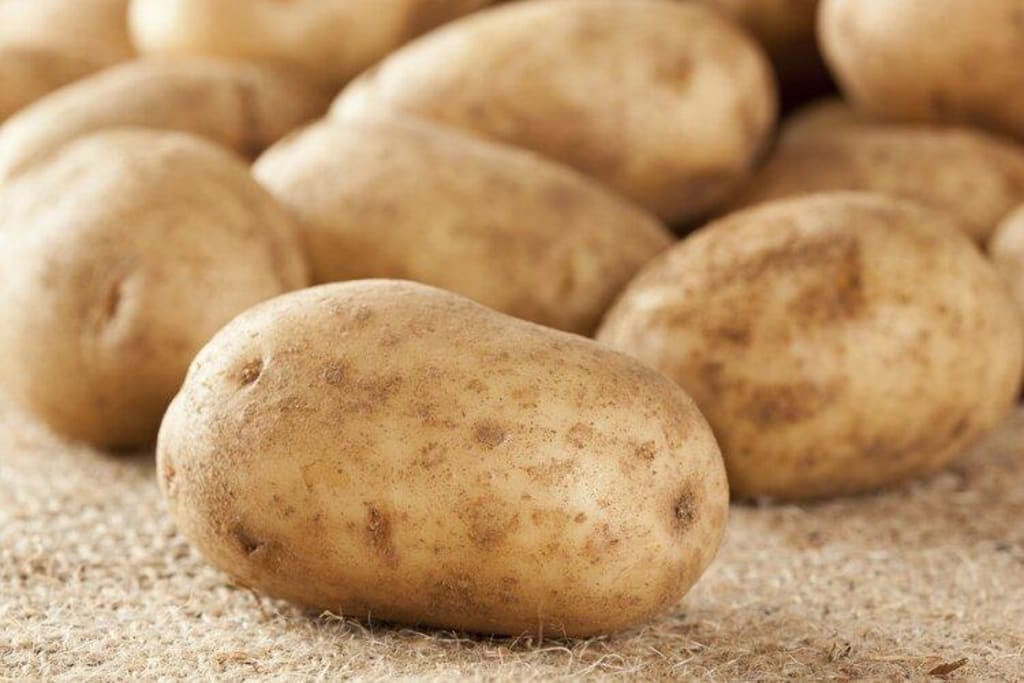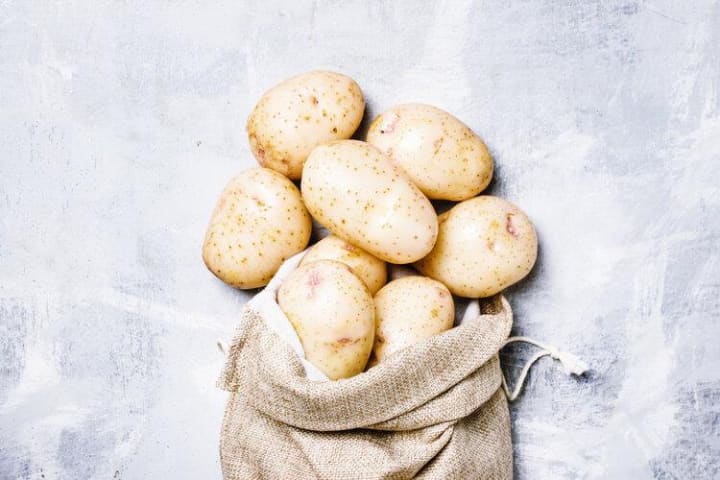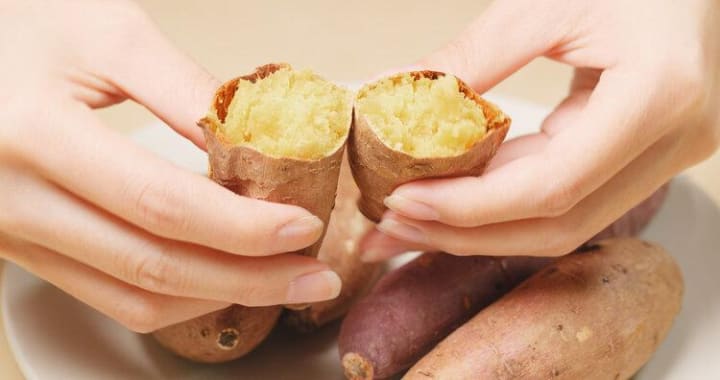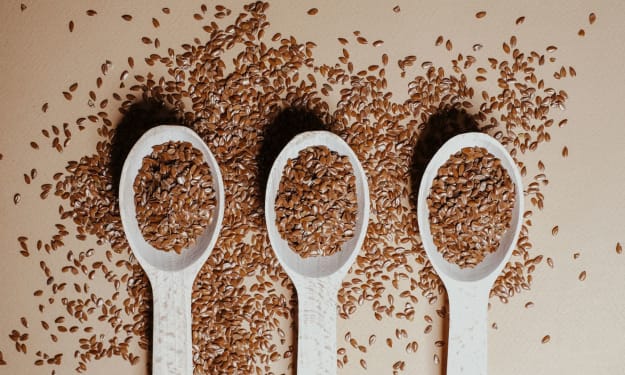
Recently, Uncle Li took the train from his hometown to Shanghai to visit his son. He thought of making a delicious meal for his son, so as soon as he got off the train, he pulled his luggage and asked his son to take him to the nearby vegetable market to buy food.
Master Li wanted to make a potato stew with chicken, but looking at a handful of potatoes in the market, he hesitated. Finally, after shopping around in the vegetable market, he bought just one duck, intending to make a duck stew instead.
"Why don't you buy potatoes? Potatoes should be quite cheap now." My son asked him why he didn't buy potatoes.
"These potatoes are so big, I don't even know what's in them. I heard on TV that some potatoes are so big because they are pumped with puffing agents! When I will send you someday home, these potatoes can not eat." Uncle Li responded loudly.
The potatoes are getting bigger and bigger is the use of bulking agents?
Potatoes are one of the foods we often eat, not only as a vegetable, or food.
Potatoes have a good overall nutrient ratio, with a lower starch content than refined white grains such as rice and steamed bread, and are also a high-quality source of vegetable protein. They also contain a wide range of vitamins, no less than leafy vegetables, with particularly high levels of B vitamins and the antioxidant vitamin C, which is good for cardiovascular health.
In addition, potatoes are also rich in potassium, dietary fiber, and Polyphemus.
The fact that the potatoes in the market are getting bigger is not due to puffing agents, but to the variety, origin,n and cultivation techniques of the potatoes.
For example, in many varieties of potatoes, detoxification of the root of the potato is very large, with an individual weight of more than 1 pound, up to 3.7 pounds.
In addition, like Gansu Xinjiang, Inner Mongolia, and other places where the climate and soil are very suitable for potato growth, coupled with the use of advanced film cultivation techniques and combined with scientific fertilization, planted potatoes are not only very large, but the yield is also very high.

Currently, bulking agents have been included in the scope of pesticide management in China, fruit farmers can use bulking agents to grow potatoes under the premise of meeting national standards.
Excessive use of bulking agents will only reduce the quality of melons and fruits, making them deformed and cracked and other problems. But will not affect human health, there is no evidence of residual puffing agent on the surface of the melon and fruit, that will produce substantial harm to the human body.
Second, eat potatoes, is it to raise blood sugar or lower blood sugar?
The potato itself is high in starch, but it belongs to a kind of coarse grains, and the consumption of coarse grains helps lower blood sugar, then the potato in the end is to raise blood sugar or lower blood sugar.
A study in the journal Nutrition found that eating potatoes in China does not cause health harm.
The study conducted a dietary survey of 14,000 Chinese residents over the age of 20, calculating and validating the cumulative average consumption of potatoes and other foods.
The results found that all-cause mortality was reduced by 53% and 39% in those with a small (≤26.7 g per day) and moderate (26.7-66.7 g per day) intake of fried/non-fried potatoes, respectively, compared with those who did not eat potatoes. However, eating large amounts of potatoes (>66.7 g per day) did not reduce or increase mortality.

And what about the relationship between potatoes and blood sugar? Potatoes have a starch content of about 11%-25%, and if you calculate at 18%, 1 pound of potatoes contains about 90 grams of starch when steamed.
A study in the journal Nutrients found that replacing 30% of white rice with potatoes, either highly cooked potatoes (with a high GI of 82.9 and a taste equivalent to stewed potatoes) or minimally cooked potatoes (with a medium GI of 56.2 and a taste equivalent to fried potatoes), did not lower post-meal blood sugar.
However, if both potatoes were eaten 30 minutes before eating rice, the peak postprandial blood glucose could be slightly reduced, especially for the minimally cooked potato, not only the peak postprandial blood glucose was reduced by 22% but also the area under the blood glucose concentration-time curve (AUX) could be reduced by 7%.
This means that eating potatoes before meals and that they are not cooked too soft and AL dent can help with blood glucose control.
And for diabetics, eating potatoes helps control post-meal blood glucose.
Because compared with refined processed rice and noodles, under the same conditions of energy, potatoes are larger, have a lower GI value, and are higher in vitamins, dietary fiber, and minerals, eating potatoes can keep you feeling full for a longer period, which can reduce blood sugar fluctuations to a certain extent, and can also consume more vitamins and minerals.
It should be noted that diabetic patients who want to control their post-meal blood sugar by eating potatoes should pay attention to the following 2 points.
To replace some of the rice and noodles with potatoes as a staple food.
The best way to cook potatoes is with little or no oil, such as steamed potatoes.

Third, with diabetes, how can I eat to effectively control sugar?
Diabetics can't just look at fasting blood sugar when controlling sugar postprandial blood sugar is also important.
Studies have found that the incidence of cardiovascular disease is 1-3 times higher in diabetics compared to the general population, and the higher the postprandial blood sugar, the higher the risk of cardiovascular diseases such as stroke, heart attack, and angina pectoralis.
If postprandial blood glucose can be controlled well, it will not only help the overall blood glucose control but also prevent cardiovascular diseases and improve the prognosis of diabetes.
Lu Hailing, the deputy chief physician of the Department of Nutrition of the Fourth Hospital of Guangzhou Medical University, suggests that diabetic patients should pay attention to the following points in their diet.
1. Eat on time and in quantity
Patients with diabetes should not overeat or be overly hungry, and should not miss one of the three meals, especially breakfast. Eating on time and in quantity can effectively avoid excessive fluctuations in blood sugar.
It is recommended that diabetic patients adopt a daily diet of three meals and two points, that is, the total daily food intake is divided into three normal meals, and the breakfast and lunch points are added between the two meals, which helps to stabilize blood sugar.
2. Chew slowly and eat in order
Do not eat too fast when eating, it is recommended to chew slowly, chew 20-30 times for each mouthful of food, and eat eight minutes full, which not only can protect the stomach and enjoy the food, but also can better control blood sugar and prevent over-eating.
When eating, it is recommended to follow the order of "soup - vegetables - meat - main food". Because of the larger volume of soup and vegetables, eating first can occupy a larger volume of the stomach, then eating meat and staple foods, which helps delay blood sugar fluctuations, and then gradually control the hypoglycemic index.
3, more intake of low GI fruits and vegetables and coarse grains
It is recommended that diabetic patients should try to eat less high GI food (GI value above 70) and more low GI food (GI value below 55).
Common low GI fruits include apples, bananas, grapes, mangoes, dates, grapefruit, pineapples, etc.; low GI vegetables include lettuce, spinach, tomatoes, eggplant, string beans, soybeans, lentils, etc.
In addition, to better control blood sugar, it is recommended that diabetics eat more coarse grains and less fine white rice and noodles. It is recommended that potatoes, sweet potatoes, taro, yams, sweet corn, pasta and green beans, and other potatoes and grains can be substituted for white rice, noodles, and other staple foods.

In general, the potatoes are large and more related to the variety of potatoes, origin, etc. Even if the expansion agent will not harm human health, can be safe to eat.
Potatoes are rich in a variety of nutrients and are a good substitute for fine white rice and noodles as a staple food, cooked with as little or no oil as possible.






Comments
There are no comments for this story
Be the first to respond and start the conversation.